Institutional Context
Summary
The University of East London has been Pioneering Futures since 1898. We have been engaging with the public sector, private sector and communities for over 120 years, from the 2nd to the 4th industrial revolution, contributing to the local economy, diversity, social mobility and inclusion.
As a leading anchor institution within East London and a global gateway to international engagement, the University exchanges knowledge with industry, government, public agencies and charities to provide innovative and impactful solutions to some of the key United Nations’ Sustainable Development Goals.
We have established a series of innovation pathways and have entered partnership with leading organisations to enhance the diversity of the talent pipeline, inspire new employment pathways, reskill workforce, promote entrepreneurship and support SME innovation.
Institutional context
Vision
In 2018 the University of East London (UEL) embarked on an ambitious 10-year strategy to become the UK’s leading careers-intensive University. Vision2028 secured the commitment, innovative ideas and productive engagement of our staff, students, alumni, industry and community partners.
Industry 4.0 Education and Links to Knowledge Exchange
We aim to drive diversity in the 4.0 talent pipeline to give graduates the skills, tools and competencies sought by employers and entrepreneurs in a rapidly changing world. We are working with industry to reshape education for the benefit of all. We nurture an inclusive industry-facing environment that is central to the creation of a more diverse talent pipeline. We have launched a multi-million pound Connected Campus improvement programme, designed to increase the accessibility of our campuses to our community and to enhance the education and industry interface. This ecosystem will stimulate new knowledge creation and knowledge exchange with the public sector, communities, businesses and charities.
Focus of our knowledge base
Business and community engagement has been at the heart of the University mission since its inception in 1898. The University’s engagement with the private and the public sector has contributed to the local economy, re-skilling the workforce and provided innovative & impactful solutions to some of the key United Nation’ Sustainable Development Goals. This has been accompanied with a wider community engagement programme focusing on social mobility, diversity, equality and inclusion.
UEL focuses on four knowledge exchange themes:
Health & Wellbeing including mental health, public health, child development, biomedical sciences and physical activity & sport
Social Sustainability including Equality, Diversity & Inclusion
Data Economy including Artificial Intelligence, Big data/data analytics, Data centres, Cybercrime and Cybersecurity
Environmental and Economic Sustainability including landscapes, built & coastal areas, productivity & enterprise development
UEL is responding to the needs of the next industrial revolution by creating the Royal Docks Centre for Sustainability (RDCS), which will be a regional hatchery for innovation and enterprise. This £6m centre will establish a series of Innovation Pathways which will deliver green, sustainable growth to students, graduates, local residents and businesses, leading to the creation of good jobs and sustainable businesses and a green and inclusive economy in the Royal Docks area.
Our research institutes and centres lead on the work with marginalised communities, local councils, NGOs and businesses. For example, our Sustainability Research Institute (SRI) are leading on three major regeneration projects with £18.6m funding and are supporting over 600 SMEs in England. The Institute for Connected Communities (ICC) designed a ‘health creation’ platform for Tower Hamlets Council Public Health Team, and engagement with the community resulted in 259 volunteers, 2,967 residents attended events and 827 resident-led activities have been initiated. Our research centres also engage with businesses in key knowledge exchange areas that support Industry 4 data economy through Innovate UK grants and Knowledge Exchange Partnerships (KTPs). We won industry awards, Innovate UK 'Certificate of Excellence' and UEL was selected as one of three finalists for a national award of the best KTP in 2022.
For further information, please send queries to Civic.Engagement@uel.ac.uk
Local growth and regeneration
Summary of approach
As a leading anchor institution within East London since 1889, our research Institutes and Centres provide the principle point of contacts with local government and other public, private and voluntary sector organizations to ensure our teaching and research is relevant and impactful. For example, the Institute for Connected Communities leads on work with Greater London Authority (GLA) and Voluntary, Community & Social Enterprise (VCSE); the Sustainability Research Institute leads on work with Local Councils, Non-governmental Organisations (NGOs) and Businesses.
Our overall approach is to ensure that we are accessible and responsive to local need. We do this by engaging in co-creative processes with partners, networking and engaging at the highest level with the bodies responsible for local growth and regeneration.
Aspect 1: Strategy
As part of East London we actively work with Newham, Barking and Dagenham, Greenwich, Hackney, Redbridge, Tower Hamlets and Waltham Forest on a range of borough forums in respect of social, community and urban regeneration programmes. We are partnering with Newham council to deliver their ‘8 Pillars’ recovery strategy and the regeneration of the Royal Docks Enterprise Zone (RDEZ), London’s only Enterprise Zone and the capital’s most ambitious regeneration project. We are also working closely with Newham council on their ‘Newham Sparks’ initiative to unlock the value of data and digital in the borough.
As an anchor institution within the region, UEL is responding to the needs of the next industrial revolution by creating the Royal Docks Centre for Sustainability (RDCS), which will be a regional hatchery for innovation and enterprise. This is a £6m project with £1.6m funding secured through the Royal Docks Enterprise Zone’s Good Growth Fund. It will connect and support staff, students and graduates of UEL with businesses and communities of East London. As London continues to move east, and the region becomes the new home of sustainable and forward-thinking businesses, UEL aspires to be at the heart of this newly emerging ecosystem. The Centre will embed a culture of sustainability in everything we do with a commitment to support underrepresented groups and drive engagement between the University and East London.
The RDCS will provide a strategic focal point that brings together existing strands of activity and will initiate new ones by establishing a series of Innovation Pathways which will deliver green, sustainable growth to students, graduates, local residents and businesses, leading to the creation of good jobs and sustainable businesses and a green and inclusive economy in the Royal Docks area.
We lead on key knowledge exchange and business support programmes with a pan-London approach, linking with the Greater London Authority, London Councils, and charities to support the health & well-being of communities; progression of young learners into the labour market; and training of key workers, including nurses, teachers and police officers. We work with local organisations and have developed a research unit that provides an evaluation service to organisations in the public, private and third sector. This includes assessing the Youth Offer in 29 London Boroughs and mapping the mentoring provision to strategically inform the roll-out of the £8.5m New Deal for Young People programme that focuses on mentoring 100,000 young people.
At the national level, we lead major regeneration programmes to develop the local energy economy and support SMEs across the East of England in collaboration with LEPs in Greater Cambridge, Greater Peterborough, Hertfordshire and New Anglia. We have also undertaken commissioned work by the Youth Endowment Fund, the #iwill Fund and the Co-op to work in collaboration with UCLan as Learning Partners for ten VCS consortiums across England and Wales (e.g. Hampshire, Greater Birmingham, Yorkshire, Greater London, Wales, Leicestershire, Derbyshire, Nottinghamshire, County Durham, Northumberland, Gloucester, Somerset and Merseyside). This work addresses the structural causes of youth violence (total project value £5.2 million). At a European and Global level, we replicate our local regeneration support approach, working co-productively with urban planners to support them in exploiting opportunities, and unlocking barriers, to developing resilient, climate adapted, and socially just cities, with a particular focus on nature-based solution planning.
We have led major initiatives to support Industry 4.0 data economy with considerable impact on the environment, public policy, standards, and industry practice. We drive Knowledge Exchange activities internally through 10 mechanisms to increase engagement of staff with business, public and third sector and accelerate the generation of economic, social and cultural impacts.
Engagement with the private and the public sector has contributed to the local economy, including supporting product & business development, re-skilling the workforce and providing innovative and impactful solutions to some of the key United Nation’ Sustainable Development Goals (SDG). We focus on Sustainable and Green-tech, Health-tech and Wellbeing, Cyber and Social Justice and Data Economy in line with the UK Innovation & Industrial Strategies and needs of our partners. We also work on SDG areas at international level with our partners in Africa and Asia, including GCRF and US Aid-funded projects in Zambia, Sierra Leone, Rwanda, Mozambique, Kenya and South Africa. We continue to coordinate an African Youth Safety Network made-up predominately of local NGOs operating within and across the continent of Africa.
We have established institutes and centres with national & international reputation to focus on key SDG strategic goals and regeneration areas. They played a key role during COVID-19 pandemic in supporting NHS Nightingale as well as communities and businesses in East London. As part of the North East London Health and Care Partnership COVID recovery plan, we worked with Newham Council on a number of service improvement studies; first supporting the service enhancement of the test, trace, and isolate system with evaluative insights, that led to the commissioning of the piloted Hotel Self-Isolation Scheme, the piloted Welfare Check-in Call programme and the Better Mental Health Community Support programme.
Aspect 2: Activity
Our Sustainability Research Institute (SRI) are leading on three major regeneration projects funded or partly funded through the European Regional Development Fund (ERDF/ESIF):
The £11.2m “Eastern New Energy” (ENE) project aims to develop the low carbon energy economy across the East of England in collaboration with LEPs in Greater Cambridge, Greater Peterborough, Hertfordshire and New Anglia. This involves working with more than 400 SMEs in the region to increase the production and local consumption of renewable energy; increase the region’s energy efficiency; enhance the capacity of the local supply chain and accelerate the rate of innovation and local ownership of energy assets.
South East New Energy (SENE) is a £6.4m project, led by the University of East London, part funded by the ERDF, to help organisations decarbonise their operations and research on how to remove the barriers to rapid decarbonisation. The SENE project will support a minimum of 200 SMEs within the programme as direct beneficiaries.
Advancing Resource Efficiency and Urban Ecology Innovations (ARENA) is a £1m project led by the University of East London, part funded by the ERDF. ARENA supports London start-ups, spin-outs and SMEs seeking to develop and commercialise their innovative ideas, products and services in the areas of resource efficiency, urban green infrastructure, and nature-based solutions for urban resilience.
UEL’s RIX Centre co-developed digital tools with learning disabled citizens, their families and communities, working with Local Authorities and NHS providers to put the voice of disabled people at the heart of regional health and care services. The centre was established with over £2 million investment from corporate sponsors and grant-funders and has pioneered digital health and care solutions with the local East London community since 2014. The Centre has pioneered a ‘multimedia advocacy’ approach to health and social care for people with learning disabilities as part of a knowledge-exchange programme promoting social inclusion and challenging health inequality. The resulting RIX Wiki software has secured revenue from 13 local government contracts across the UK since 2017 and has been selected by the NHS National Innovation Accelerator to scale-up health-service adoption nationally. Pilot implementation programme of RIX software-as-service beyond London include services in Gloucestershire, Leicestershire, Oxfordshire, Cambridge, Norfolk, North Tyneside, Devon, Cornwall and North Wales.
Our Institute for Connected Communities (ICC) designed an innovative framework called ‘Well Communities’, facilitating the co-creation of solutions for disadvantaged communities to improve health and wellbeing, build resilience and reduce inequalities. The framework has been developed over three phases with 40 London neighbourhoods across 20 London boroughs and was supported initially by Big Lottery funding valued 12 million. The third phase - renamed ‘Communities Driving Change’ - was repurposed by Tower Hamlets Council Public Health Team to help and support vulnerable people isolated by the pandemic.
Our Online Harms and Cybersecurity Unit supports the police and the criminal justice system to understand and respond to threats, opportunities and motivations presented by technology. The centre is a member of the International Advisory Committee of the International Commission on Cyber Security Law and secured £900k from Horizon2020 as part of an Innovation programme to provide insight into ‘Youth Pathways into Cybercrime’. We have also entered partnership with London Metropolitan Police and Babcock International Group to train London police officer recruits through degree-level apprenticeships.
UEL’s impact driven Vision 2028 embeds local growth & regeneration impact through research and knowledge exchange within its teaching programmes. One such example is our work with global sports brand Umbro China. A collaboration developed by Fashion-based academic Wesley Hartwell, enabled students across the whole Fashion BA to collaborate with global sportswear company Umbro China. They are developing designs and innovative fabrics to launch a trio of sustainable performance, sportswear, and streetwear lines. The designs will be shown at the London and Shanghai Fashion Week events. Subsequently, the garments produced by Umbro China will be retailed in UEL-designed zero-carbon pop-up shop.
The new Hospital and Primary Care Training Hub was launched in March 2022 with cutting edge simulation and augmented/virtual reality equipment - and which UEL is the first University in Europe to procure and utilise. This provides an end-to-end healthcare education, demonstrating cutting-edge, innovative inter-professional practice and simulation technologies to enhance careers-1st learning, to tackle health inequalities, and to supply the healthcare sector with practice-ready professionals.
We engage with businesses in key knowledge exchange areas that support Industry 4 data economy through Innovate UK grants and Knowledge Exchange Partnerships (KTPs). For example, we have undertaken a £1.36m Innovate UK project in collaboration with industry to transform financial and legal services using voice and emotional AI. This innovation detects and interprets emotion and linguistics in voice at call centres to combat fraud and improve customer experience. The socio-economic impact reduces the effect of insurance fraud on policy holders, reduce the burden on public resources dealing with fraudulent cases and identify vulnerable customers. We have also worked on KTP projects in collaboration with industrial partners to embed sophisticated data centre modelling capabilities within industrial products to drive the circular economy and the green environment agenda.
Aspect 3: Results
Our RIX Centre led an innovative response to the Pandemic, winning the NHS TechForce19 competition to deploy technology for vulnerable people isolated by COVID-19 across the UK. East London’s Redbridge Borough became a focus for whole-system trial adoption of this RIX post-pandemic digital-care solution. RIX completed a Pilot implementation programme of RIX software-as-service with a UK SME Partner and Redbridge Local Authority’s Adult Services, supporting adoption of RIX software with 200 local citizens with disabilities. The Centre has evidenced improved wellbeing for service-users and improved quality and efficiency for support services, the work gained global recognition.
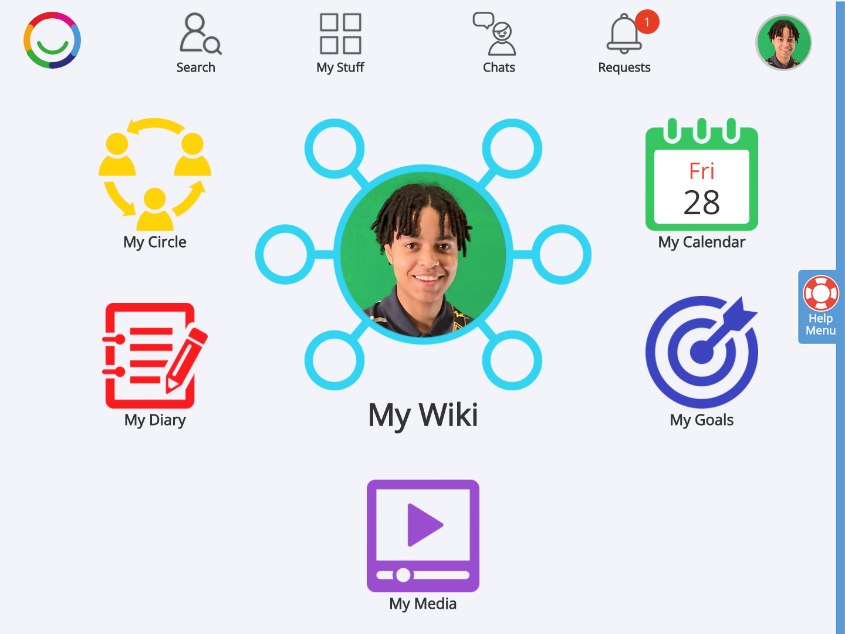
RIX WIKI software
The ‘Communities Driving Change’ programme led by the Institute for Connected Communities (ICC) designed a ‘health creation’ platform for Tower Hamlets Council Public Health Team. The platform improves the health of communities by identifying issues impacting health & well-being, recruiting volunteers and developing new ways to improve health & well-being of local people. The programme operates in 12 most deprived neighbourhoods in Tower Hamlets. The level of engagement with the community within a six months period resulted in 259 volunteers, 2,967 residents attended events, 827 resident-led activities initiated, 56 residents have attended training around building capacity in their communities and 176 young people have been involved. Furthermore, through this 4 years programme ICC established an excellent partnership with Tower Hamlets council and the local voluntary sector, leading to the commissioning of Tower Hamlet Councils initiative to expand and upscale services to deliver trauma informed approaches in the borough. This trauma-informed project involved approximately 900 registered leaners (public and voluntary sector employees and community members), and 175 direct beneficiaries and a further 5,566 indirect beneficiaries from each of the pilot sites.
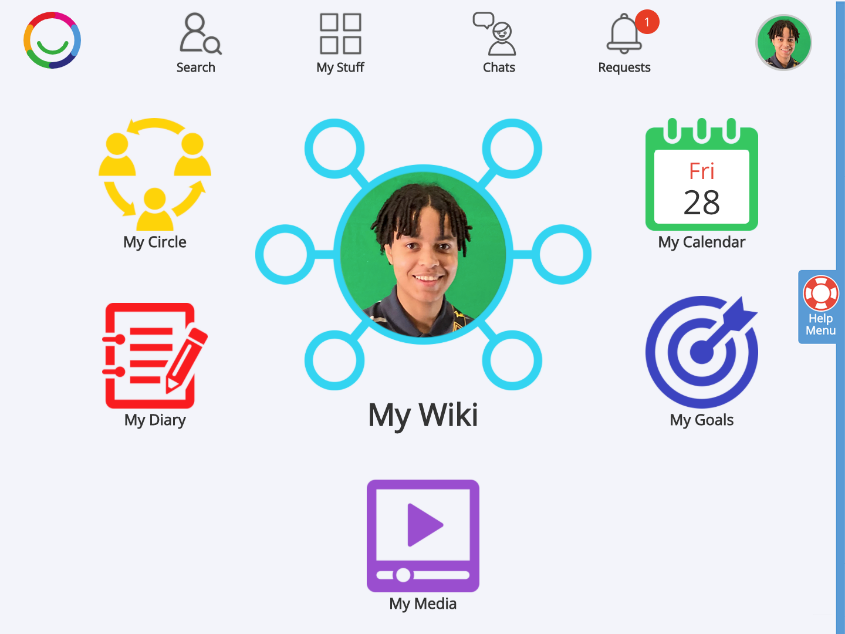
Communities Driving Change Partners
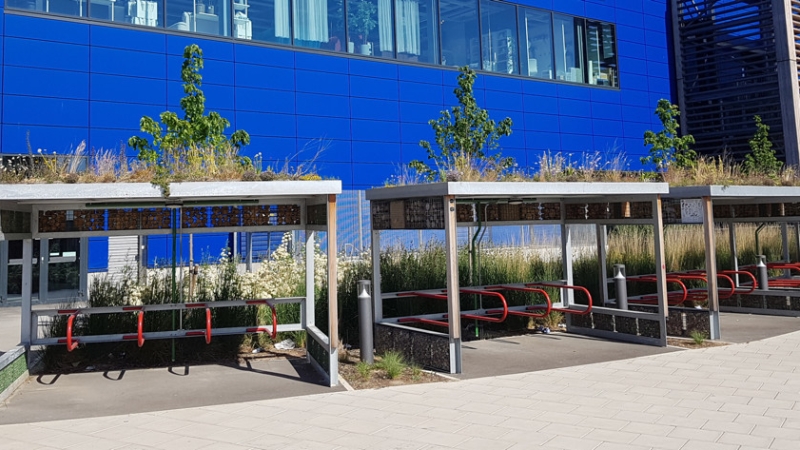
Green roof bicycle shelters outside of IKEA at North Greenwich, London
Our architecture live-workshops programme at UEL completed five KE projects involving Master students and staff – two of which featured at UN Climate Change Conference (COP26) in Glasgow. The first project involved designing and creating a VR exhibition for the United Nations Environment Programme on Peatlands, developing and delivering a willow pavilion at COP26 itself where a concordat between the Scottish Government and the Chilean Government was signed by their respective Environment Ministers - Peatland Pavilion at UNFCCC COP26 (unep.org). In the second project the ‘Pollution Pods’ created by a UEL artist Michael Pinsky were installed in a series of cities from London to Glasgow’s COP26 (Pollution Drift – M i c h a e l P i n s k y) to communicate the issues of air quality.
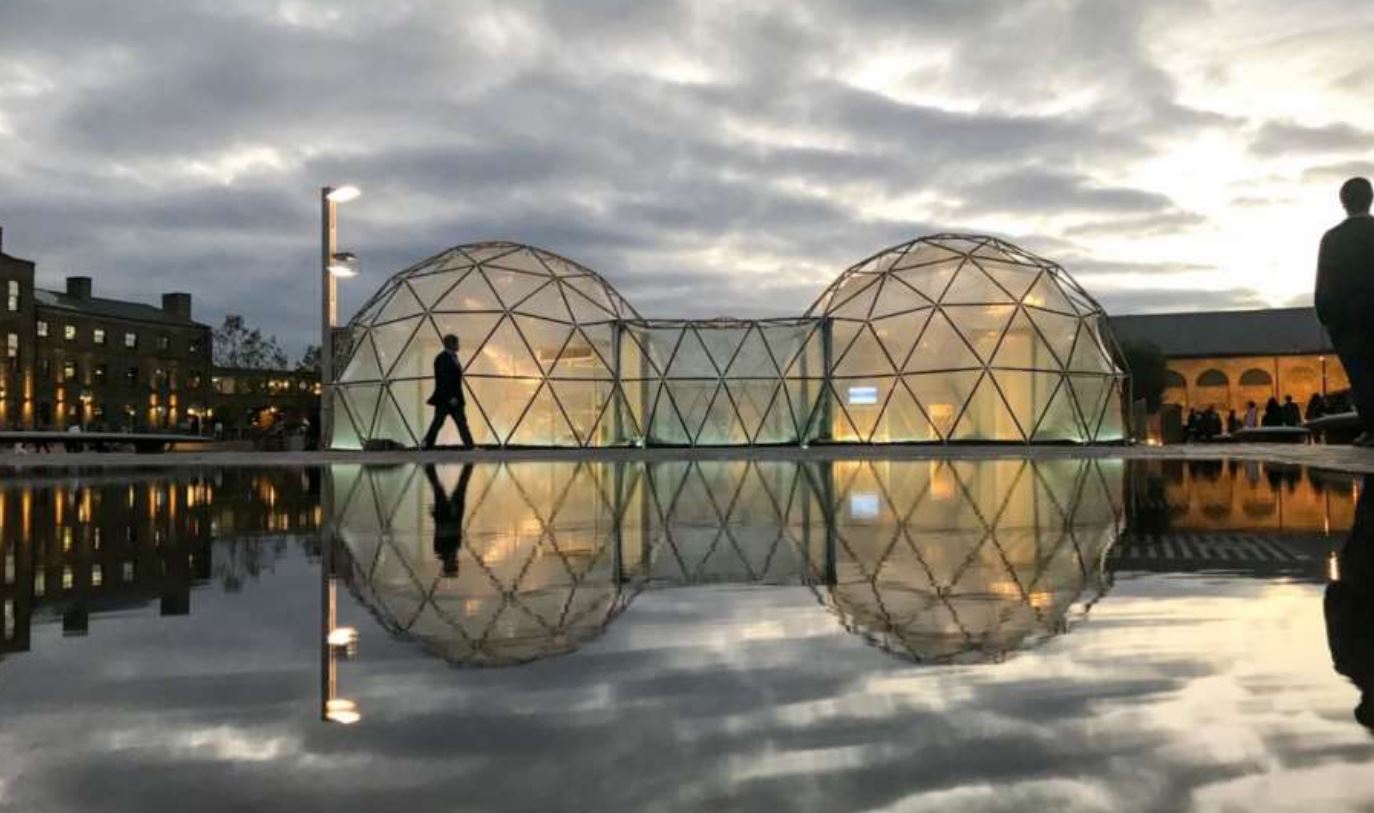
Pollution Drift at London Kings Cross 2021
Our work in cybercrime informed child and adult online harms and protection practice at national and international level and improved policy, industry, police and social work practice responses. This work informed EU policing practice and developed a programme raising awareness about illegal online behaviour amongst young people in 9 EU countries. It also impacted on government policies regarding online harm and internet service regulation in the UK and development of a child online protection policy and five year implementation plan in Rwanda. The key beneficiaries are young people and their parents/carers, vulnerable children and agencies working to protect them from online harm and policy makers in the area of child online protection and adult online harms. Our online Harms and Cyber Unit advises the Europol Cybercrime Centre and the Technology Coalition which includes Meta, Microsoft, Verizon, Twitter and Google.
We have won a number of awards for our KTP projects with industry. For example, the UK innovation and Entrepreneurship Award at BCS, Computing UK IT Industry Awards and DCS Award under the category "Data Centre Energy Efficiency Project of the Year". These awards are designed to reward the product designers, manufacturers and suppliers providing technology solutions. We were also awarded by Innovate UK the 'Certificate of Excellence' and the highest grade of "Outstanding" for a Knowledge Transfer Partnership (KTP) and published our KTP work on their portal:
The University was selected as one of three finalists for the Best Knowledge Transfer Partnership Award in 2022, with an innovative project which created a circular economy in the data centre sector, boosting energy efficiency and sustainability, while our KTP Associate was named as one of the top 16 in the Future Leader Award.
Public & Community Engagement
Summary of approach
UEL’s approach to public and community engagement is focused on our strengths as an anchor institution and our strong tradition of working collaboratively, engaging with communities and responding to local challenges. Central to Vision 2028, UEL’s strategic plan, engagement is embedded in one of four strategic objectives: ‘to increase the economic, social and cultural impact of our education, research and enterprise activities to the communities we serve’. UEL engagement is delivered in three core areas: engagement with our communities; engagement through the curriculum and engagement with local challenges. We focus on four thematic priorities: health and wellbeing; social sustainability including arts, culture and heritage; digital data and cyber; environmental sustainability.
Aspect 1: Strategy
UEL’s Vision 2028, was developed in response to local, national and global challenges and opportunities to address social, economic and health inequalities in an ever-changing world through education, research and enterprise, advancing education and industry for the benefit of individuals and the planet.
Engagement underpins all four Vision 2028 objectives but is explicit in our aim and our journey ‘to increase the economic, social and cultural impact of our education, research and enterprise activities to the communities we serve’.
Public and community engagement is championed at the highest level by our Vice Chancellor and President and Pro-Vice Chancellors and is included in the responsibilities of senior academics and professional services managers. Six Directors of Impact and Innovation are responsible for embedding engagement across all academic Schools.
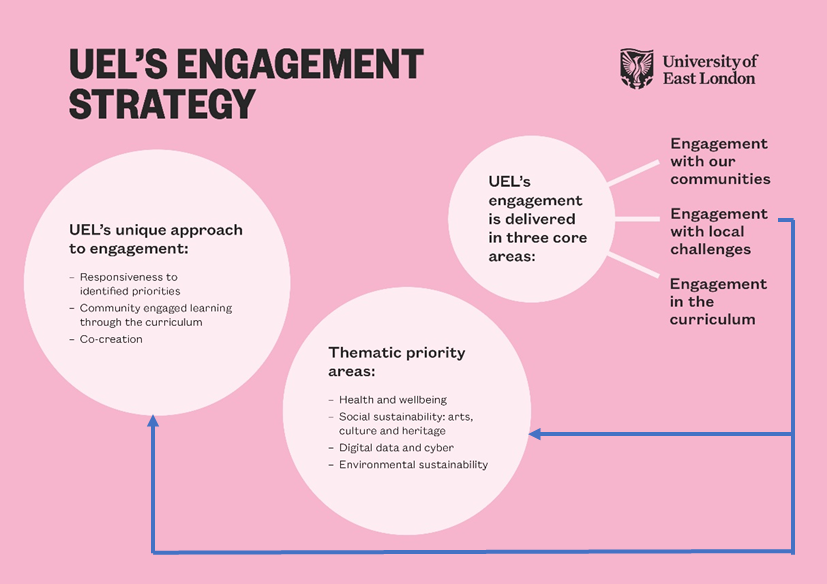
Research at the University of East London has a distinct character, with an emphasis on real-world benefits that impact both local and global communities. We iteratively enhance our strategic approach and thematic priorities.
Our engagement is centrally coordinated, energised and monitored through the Office for Postgraduates, Research and Engagement (OPRE) with recognition that activity takes place across all academic schools, research centres and institutes, plus many professional services.
We have mapped our engagement and impact priorities against the UN Sustainable Development Goals (SDGs), drawing on sustained partnership development and participatory approaches with communities.
We have further developed our engagement priorities through:
Engagement with our communities: listening to our communities, facilitating the active participation of communities with a focus on co-production, for example, working with purpleSTARS, a group of artists and technologists with and without learning difficulties based at the Rix Centre, to make museums more inclusive. (UEL's RIX Centre partners with Museum of London | University of East London)
Engagement in the curriculum: embedding student knowledge exchange, student research in, with and for communities in the Professional Fitness and Mental Wealth curriculum; seed-funding programmes further support student engagement with locally responsive projects in the curriculum and co-curriculum.
Engagement with local and global challenges: rapid response and sustained engagement in partnership with local organisations to identify and address challenges, issues and concerns as articulated with/by community partners, in particular with vulnerable and marginalised groups, for example, rapid response to the impact of Covid-19 locally and on vulnerable communities in Zambia.
Our priority themes have developed through extensive engagement across the three strands to align with our research strengths and impact priorities: Health and wellbeing; Social sustainability including arts, culture and heritage; Digital data and cyber; Environmental sustainability.
UEL’s Office for Institutional Equity provides a steer on equity matters across engagement, with a focus on inclusion. EDI is embedded in processes, project delivery and engagement events. The work we deliver reflects our commitment to EDI.
UEL’s approach is based on in-depth and ongoing consultation with a range of communities, organisations and stakeholders to identify our most pressing challenges. We commissioned an innovation specialist agency to survey the community skills gaps in East London to ensure the programmes we deliver and spaces we build are responding to trends and needs within the region. UEL’s membership of networks and partnerships, enables alignment with borough-wide priorities, for example, Newham Public Health, Tower Hamlets health inequalities initiative and Economic Development Partnership Board…etc, e.g. TELCO Citizens, Royal Docks Enterprise Zone and Barts Health Trust Interfaith Network.
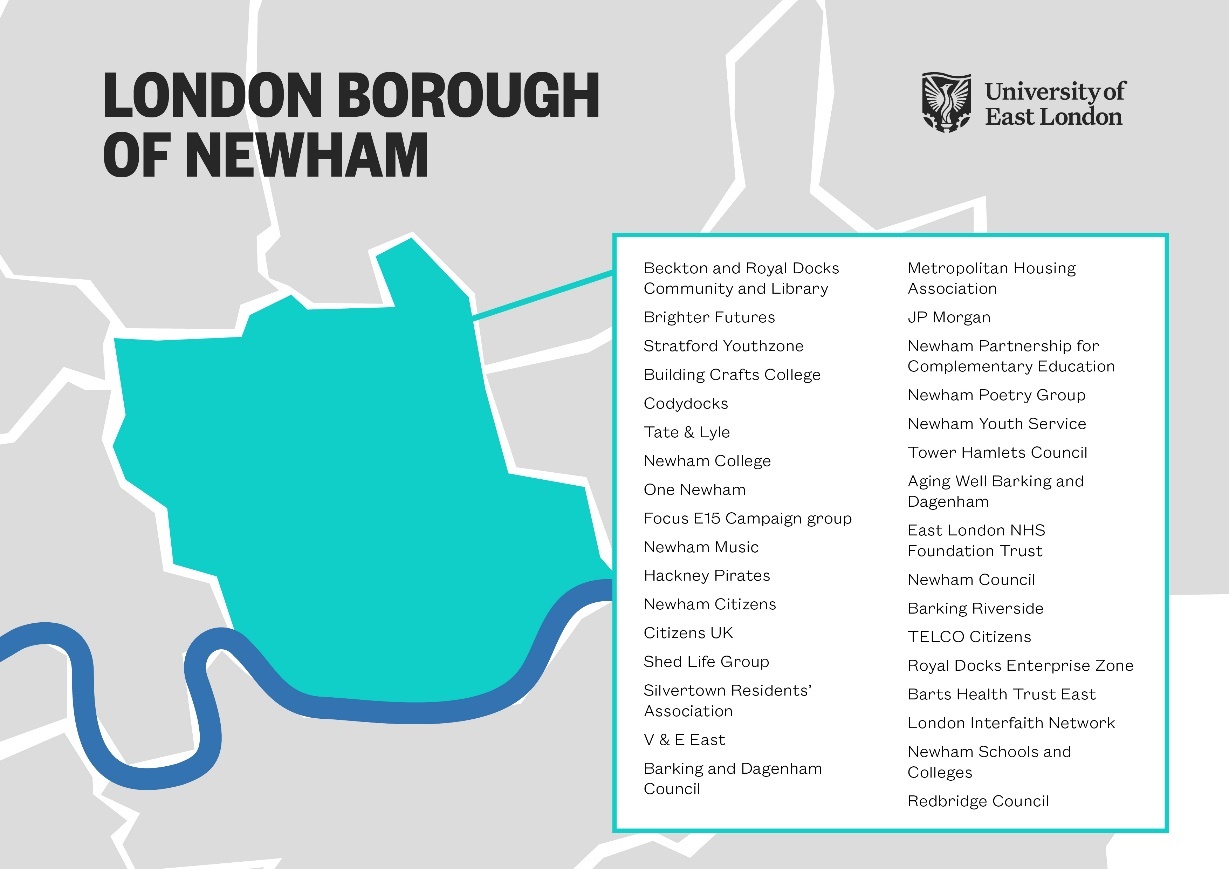
Aspect 2: Support
Engagement at UEL takes place across all academic schools, research centres and institutes and community clinics. Careers and Student Enterprise through volunteering and mentoring programmes, Outreach, UEL Sports and our Library Archive all conduct engagement activity.
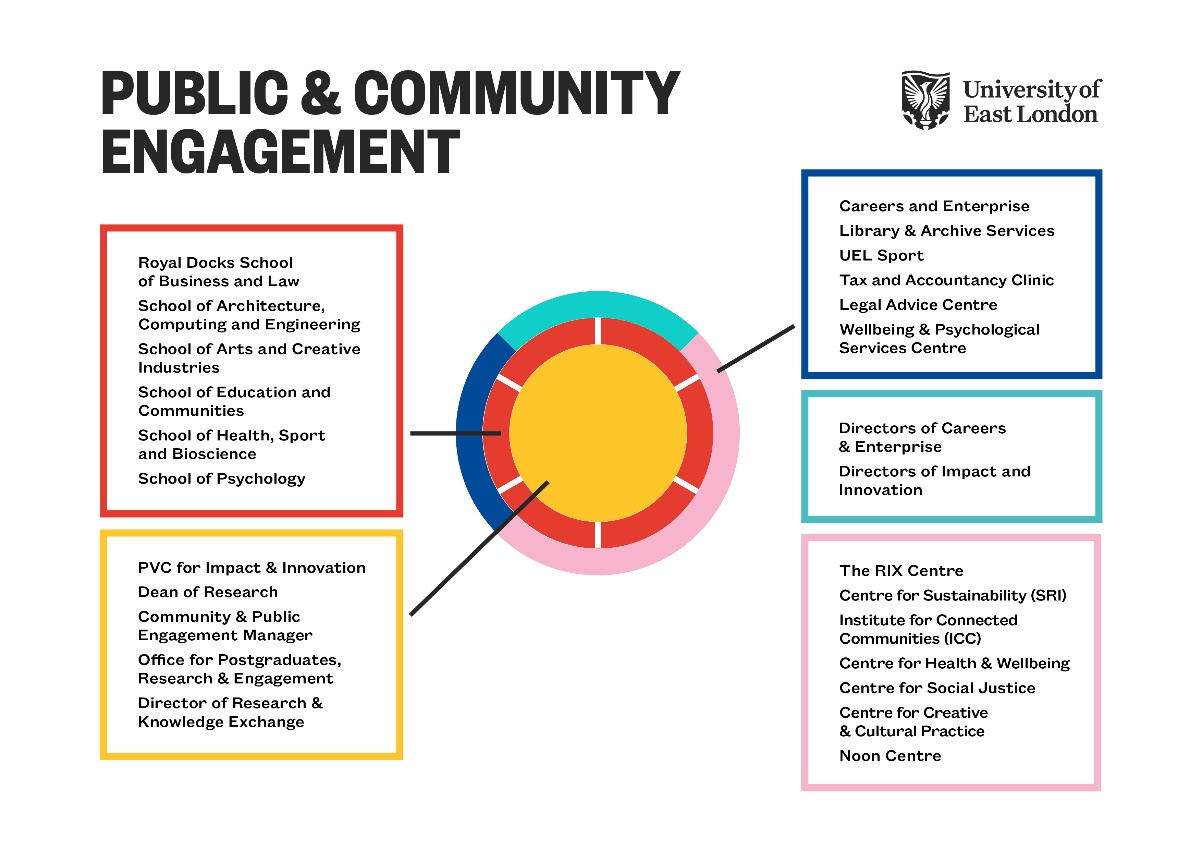
Engagement Support Structure
The Office for Postgraduates, Research and Engagement (OPRE) plays a key role in catalysing and scaffolding engagement in response to key local priorities. Responsible for all research support functions, this team, with a dedicated Public and Community Engagement Manager, brokers engagement and provides holistic support for engagement through training, sharing practice and opportunities and developing tools and programmes to enhance engagement across the institution.
Our research institutes, Sustainability Research Institute, Rix Centre and Institute for Connected Communities, act as interdisciplinary hubs, drive engagement across our priority themes, playing a key role in stakeholder engagement and responding to priorities identified locally, nationally and globally. Our institutes provide workshops and seminars for staff and students across the institution and bring their expertise in participatory research and evaluation to inform shared approaches.
Interdisciplinary centres with membership drawn from across Schools and Institutes are charged with increasing engagement in priority areas: Centre for Social Change and Justice; Centre for Health; Wellbeing and Inclusion; Centre for Creative and Cultural Practice.
Engagement is embedded in all academic schools: our community clinics provide a focus for student knowledge exchange in services which are valuable to our local communities.
Programmes to drive responsive engagement
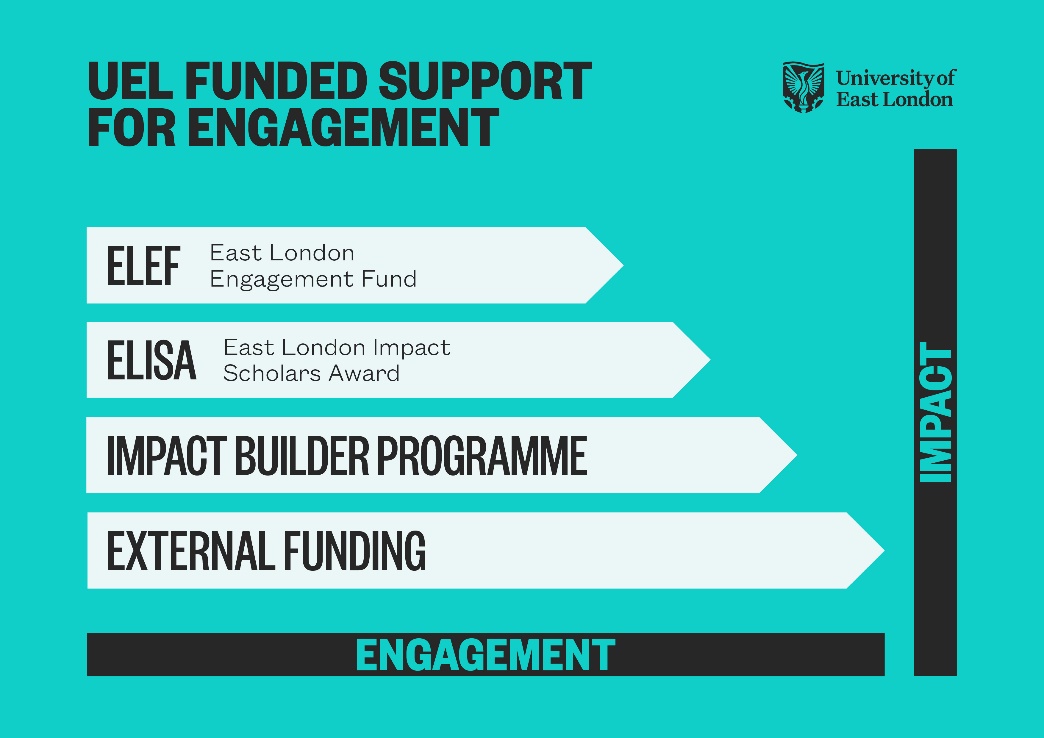
UEL’s has invested in four institution-wide support programmes. Overseen by the Pro-Vice Chancellor for Impact and Innovation this is a progressive offer, with each step in the framework designed to build on the one before, enabling academics to grow their experience of delivering high-quality, responsive engagement. Engagement activities are funded against a range of criteria, including the 17 Sustainable Development Goals, value for money and alignment to strategic themes and priorities:
East London Engagement Fund (ELEF): funding to run engagement events alongside a community-based organisation, for knowledge exchange, to develop partnerships and research questions.
East London Impact Scholars Award (ELISA): students and academics working with community organisations to explore a topic, exchange knowledge and co-create with non-academic audiences.
Impact Builder Programme: interdisciplinary groups of academics working with non-academic partners to develop new research proposals which embed engagement and impact planning.
External Research Funding support: academics supported by OPRE to identify, bid for, manage and monitor externally funded projects
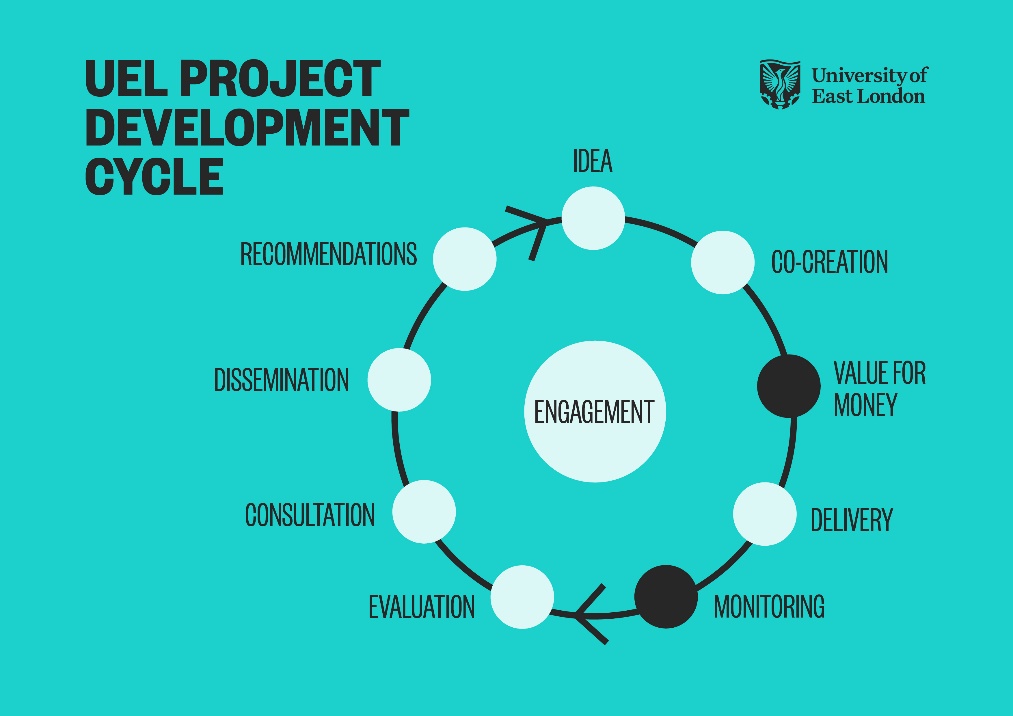
Examples of workshops and support include:
Thematic and place-based workshops delivered to explore local challenges and priorities and to develop interdisciplinary responses to these
Workshops, events and conferences to develop engagement skills and approaches
Best practice workshops plus signposting to external training events
An intranet site hosting information, resources and updates about all elements of engagement activity, as well as links to internal and external sources for funding and collaborations.
Enquiries from the public are directed to and triaged through three externally facing email addresses (Civic Engagement, Volunteering, Education and Community Partnerships). Engagement funding opportunities are sent directly to Directors of Impact and Innovation for sharing in their School.
Recognition of Engagement
UEL’s Public and Community Engagement Awards have been held annually since 2019 to recognise public and community engagement in four categories:
Individual
Partnerships
Innovation
Student Contribution
Engagement is recognised and celebrated within the annual Vice Chancellors Awards including an award for Civic Engagement.
Engagement is one of three pathways in the academic progression framework, given equal weight to the research and teaching pathways and providing criteria for engagement at each of three progression stages. Academic colleagues are self-assessed against the criteria during the annual Performance and Development Review and encouraged to identify actions and training to progress this key aspect of the academic role.
Aspect 3: Activity
Engagement activity permeates learning and teaching, research and knowledge exchange across Schools and services, underpinned by engagement themes and Institute-led hubs to drive engagement as mentioned in Aspect One.
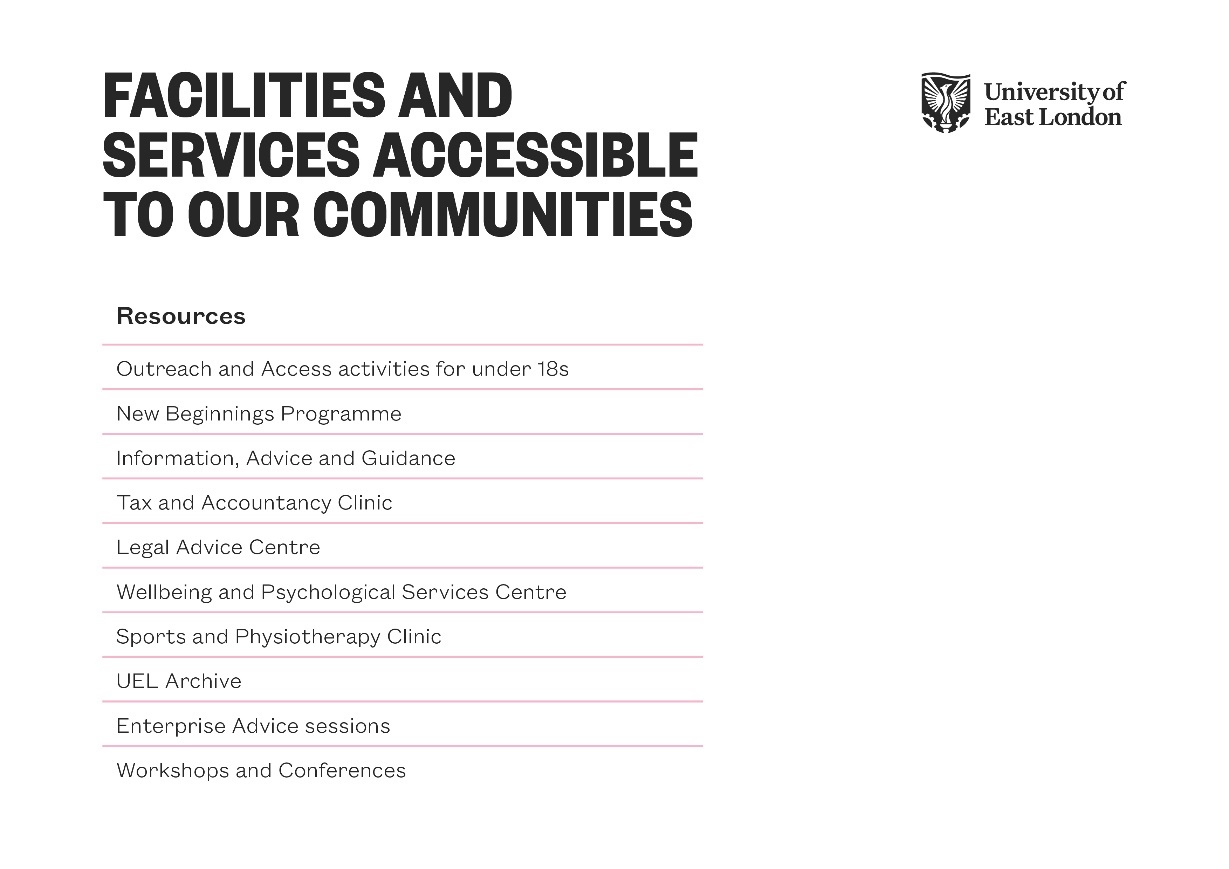
Engagement is embedded into flagship campus events such as the Royal Docks Festival where over 125 recent engagement projects aligned to the SDGs were added to a map of east London with an invitation to students, staff, communities and partners to identify future projects.
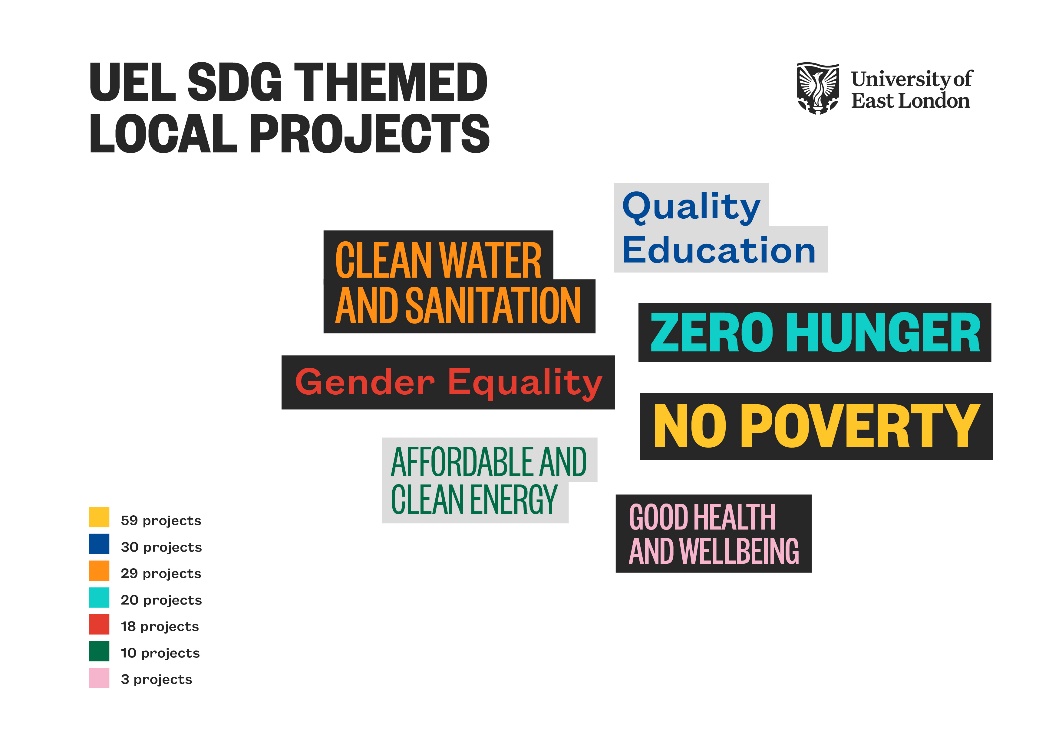
We further illustrate the breadth of our engagement with examples from the curriculum, schools, research institutes and professional services:
students from the School of Architecture, Computing and Engineering sharing their ideas for creative design through renovating a disused office building
collaborative research exploring the sustainability of small businesses led by the Centre for Innovation Management and Enterprise, part of the Royal Docks School of Business and Law
the Sustainability Research Institute developing strategies to become Net Zero with local organisations
engaging East London’s children in Sport In Your Futures | University of East London (uel.ac.uk)
Engagement in response to local challenges: health inequalities
To illustrate the depth of engagement we highlight our response to the Covid pandemic within the context of sustained engagement to address health inequalities locally and globally through the Institute of Connected Communities and the Schools of Health Sport and Bioscience. Our current work | University of East London (uel.ac.uk):
Activities focused on providing scientifically-sound information to the public, through sustained public engagement, media appearances and consulting, primarily addressing the health inequalities exacerbated by the pandemic, led by Professor Winston Morgan and Covid vaccinations with Professor Sally Cutler.
Collaboration with Newham Public Health to develop the Covid Champions, an innovative approach to the dissemination of public health information, which has been replicated nationally.
Engagement with our communities: Brickfields
Brickfield Newham, developed by Dr. Lynne McCarthy, Co-Director of the Centre for Social Justice, took a multi-disciplinary approach to engagement, matching the practical process of brickmaking to gathering research and disseminating the results through drama performances across Newham, including the first public performance in Newham after the first Covid pandemic lock-down.
Communities and partners participated in events in the Royal Docks, centred around knowledge-exchange via performances, a residency and open events. Activities included brickmaking, building and firing a kiln.
Rooted in Newham’s often hidden history of industrialisation and habitation, Brickfield Newham utilised creative engagement tools to advocate for housing justice.
Engagement in the curriculum: Pollution Pods
Developed by Michael Pinsky, in the School of Architecture, Computing and Engineering, the Pollution Pods have revolutionised how information about air pollution can be disseminated. The Pollution Pods installation has toured internationally and helped visitors, including policy makers and UN delegates, grasp the global implications of declining air quality for health and wellbeing. The effect of his installation differs from other educational methods by stimulating multiple senses directly and invoking emotional rather than purely intellectual responses. Students have been involved in all elements of the development and touring of the exhibition and engaging the public in their experience of the exhibit.
Aspect 4: Enhancing practice
Our evaluation framework provides for customisation of evaluation methods to suit activities/partner needs supported by training and workshops.
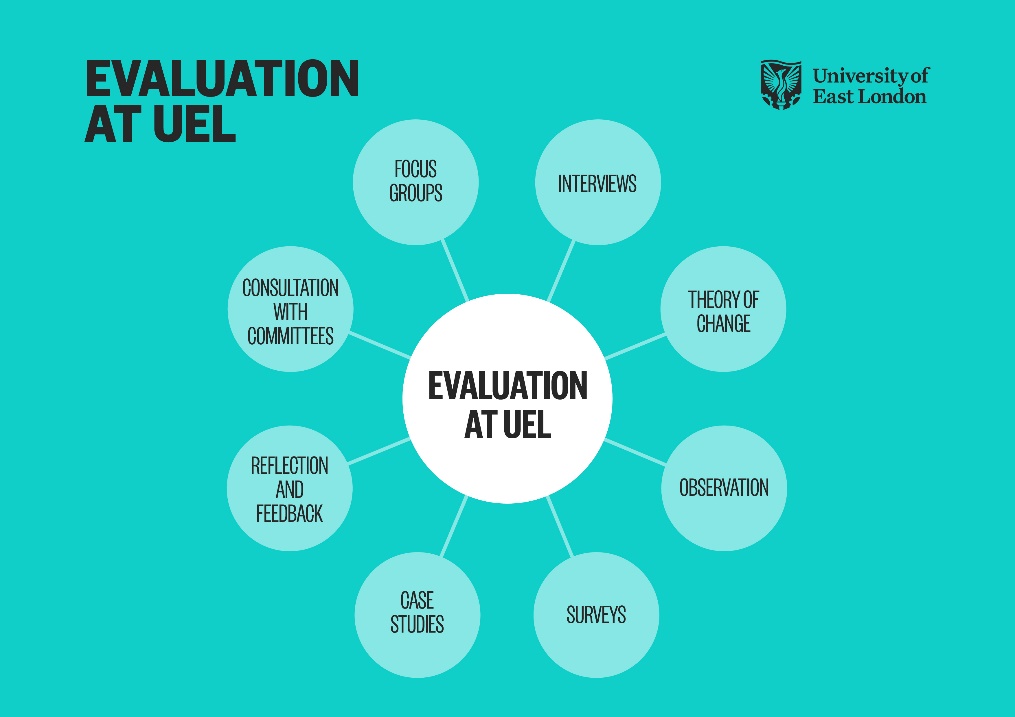
Projects delivered via our structured programmes must complete an end of project report which has core questions alongside project level evaluation. In addition to this we evaluate at programme level and continually iterate the programme framework in response to create the most rigorous, cost-effective and equitable vehicles and processes for allocating funding to the development of engagement activity.
Our evaluation strategy also includes a strand to increase the capture of information, broad evaluation and impact through Hivve’s Impact Tracker by making use of the Tracker mandatory for funded projects.
We have piloted an evaluation toolkit with some of our larger projects including Brickfields and the Stopping Place, producing in-depth reports and trialling a range of audience evaluation tools on site in these place-based engagements. We will be rolling the toolkit out in Summer 2023 through a series of practical workshop, capturing feedback on the tools before launching. We have allocated dedicated resource of 0.2 FTE over the last two years plus the support of a research assistant in the piloting of approaches and development of the toolkit.
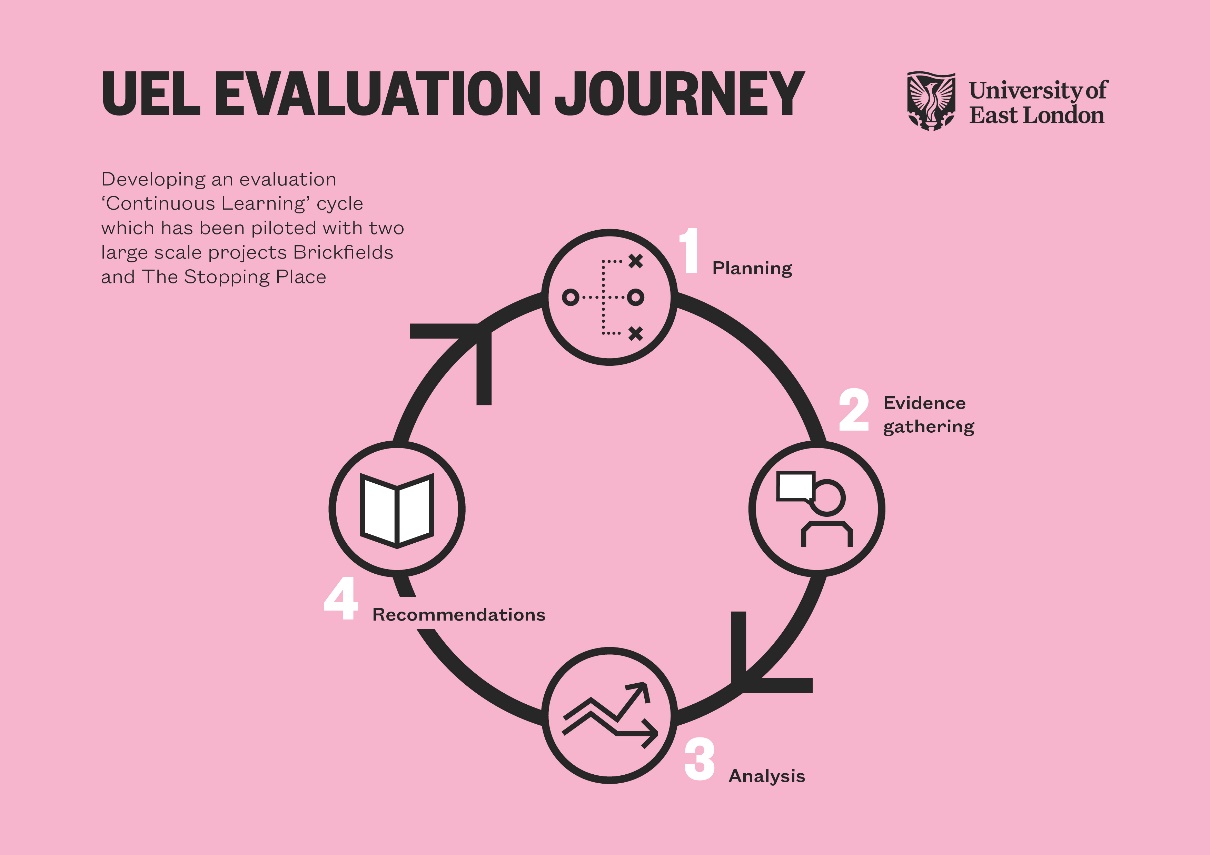
We have provided evaluation training and development as part of our annual Staff Development Week and the Researcher Development Programme. The Institute for Connected Communities has undertaken extensive evaluation for a variety of local and international organisations through its Evaluation Unit and provides support for our structured programme projects to develop their theory of change. Dr. Marcello Bertotti shared his expertise with colleagues, developed in the production of his social prescribing evaluation.
The Mental Wealth and Professional Fitness curriculum includes the Community Connections dimension which provides integrated evaluation aligned to the discipline. For example, in MA Architecture’s Shed Life project, and other annual Construction Week projects, community clients are invited to contribute to evaluation and grading by attending end of project presentations, providing recommendations and offering feedback to students.
The institution level performance indicator (KPI) is a Net Promoter Score, designed to measure the impact of engagement activities in terms of reputation/knowledge. This was measured at +30 for 2021.
Aspect 5: Building on success
The governance and monitoring of engagement is integrated within our institutional processes at School/Institute/Service portfolio-level supplemented by specific working groups:
annual planning and monitoring through the institutional business planning process and annual research reviews
strategic review, development and in-year reporting and through the Impact and Innovation Committee
oversight of strategic implementation of engagement and knowledge exchange policies by the Knowledge Exchange Concordat (KEC) Working Group. Recommendations are used to enhance existing processes and implement new ones.
We have used a range of institution and external tools and mechanisms to guide and evaluate UEL’s strategic approach to engagement:
Public and Community Engagement Task and Finish Group completed a deep-dive review of engagement using the NCCPE EDGE and has repeated this self-assessment annually
Review of the role/place of engagement in the Research Excellence Framework to inform the next phase of strategic development (including integration of engagement within the Impact Builder Programme).
The KEC action plan and recommendations
Recommendations on ways of working from the Community Consultation Group and its evolution (see Royal Docks Centre for Sustainability below)
Membership of the London Higher Civic University Network where practice is shared, key external drivers are explored and participation in collective initiatives such as the Civic Map - London Higher
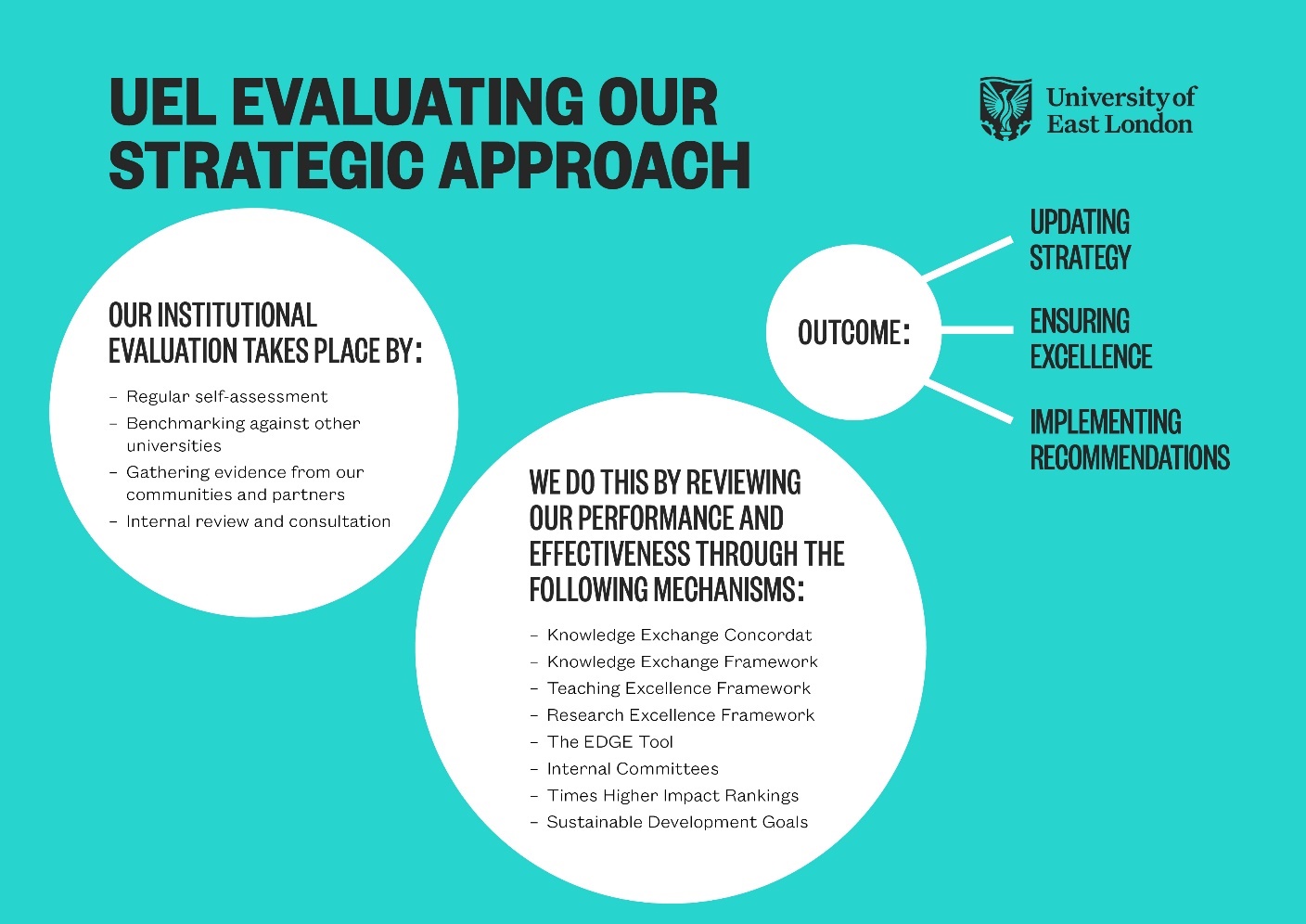
Examples of action taken from our reviewing processes and progress include:
developing an institution-wide approach to engagement
launching of the Public and Community Engagement Awards for staff and students designed to celebrate and recognise engagement activities
integration of engagement into UEL’s annual planning process and academic progression and promotion frameworks
the embedding of community-engaged learning into the curriculum, creating meaningful and mutually beneficial activities that respond to identified needs
mapping our engagement and impact against SDGs
UEL commissioned an external consultation focused on creating an External Advisory Engagement structure, which has been instrumental in ensuring activities delivered are relevant. It will also provide strategies that focus on effective and consistent engagement with our partners.
We have reflected the strategic assessment and feedback from our internal and external networks in the development of the engagement strand of the Royal Docks Centre for Sustainability, a significant hub to catalyse engagement. The overall approach and programme has been developed through stakeholder focus groups, alongside feedback from a range of internal stakeholders. We are bringing people together in new spaces for engagement, collaboration and co-production, to generate and share knowledge and engage with research that responds to challenges in our thematic areas.
UEL’s REF 2021 Environment Statement’s feedback documented the “inclusivity of research” as a particular strength. Our Vision 2028 strategy outlines our aspiration for “UEL’s academics to generate new thinking that impacts people and planet.”
At UEL this means co-design, co-authorship with community partners and meaningfully engaging with students, organisations and communities. These strengths demonstrate a continuation of the tradition of engagement and knowledge exchange at UEL. We will continue to build on our best practice, generating and sharing knowledge with our communities locally and globally.
Note You are currently viewing the latest version of this narrative statement. View the previous version as published in previous iterations of the KEF (KEF1 and KEF2)